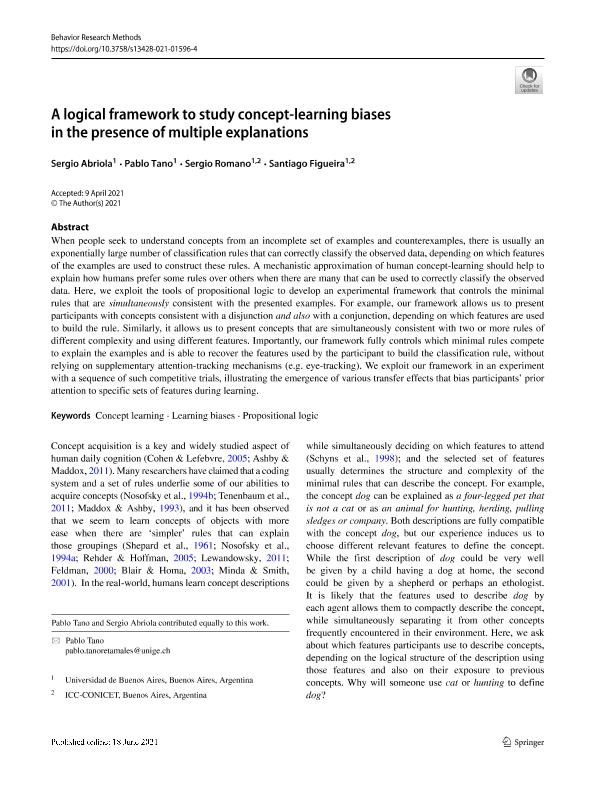Artículo
A logical framework to study concept-learning biases in the presence of multiple explanations
Fecha de publicación:
06/2021
Editorial:
Springer
Revista:
Behavior Research Methods
ISSN:
1554-3528
Idioma:
Inglés
Tipo de recurso:
Artículo publicado
Clasificación temática:
Resumen
When people seek to understand concepts from an incomplete set of examples and counterexamples, there is usually an exponentially large number of classification rules that can correctly classify the observed data, depending on which features of the examples are used to construct these rules. A mechanistic approximation of human concept-learning should help to explain how humans prefer some rules over others when there are many that can be used to correctly classify the observed data. Here, we exploit the tools of propositional logic to develop an experimental framework that controls the minimal rules that are simultaneously consistent with the presented examples. For example, our framework allows us to present participants with concepts consistent with a disjunction and also with a conjunction, depending on which features are used to build the rule. Similarly, it allows us to present concepts that are simultaneously consistent with two or more rules of different complexity and using different features. Importantly, our framework fully controls which minimal rules compete to explain the examples and is able to recover the features used by the participant to build the classification rule, without relying on supplementary attention-tracking mechanisms (e.g. eye-tracking). We exploit our framework in an experiment with a sequence of such competitive trials, illustrating the emergence of various transfer effects that bias participants’ prior attention to specific sets of features during learning.
Palabras clave:
CONCEPT LEARNING
,
LEARNING BIASES
,
PROPOSITIONAL LOGIC
Archivos asociados
Licencia
Identificadores
Colecciones
Articulos(ICC)
Articulos de INSTITUTO DE INVESTIGACION EN CIENCIAS DE LA COMPUTACION
Articulos de INSTITUTO DE INVESTIGACION EN CIENCIAS DE LA COMPUTACION
Articulos(SEDE CENTRAL)
Articulos de SEDE CENTRAL
Articulos de SEDE CENTRAL
Citación
Abriola, Sergio Alejandro; Tano, Pablo; Romano, Sergio Gaston; Figueira, Santiago; A logical framework to study concept-learning biases in the presence of multiple explanations; Springer; Behavior Research Methods; 6-2021; 1-19
Compartir
Altmétricas




